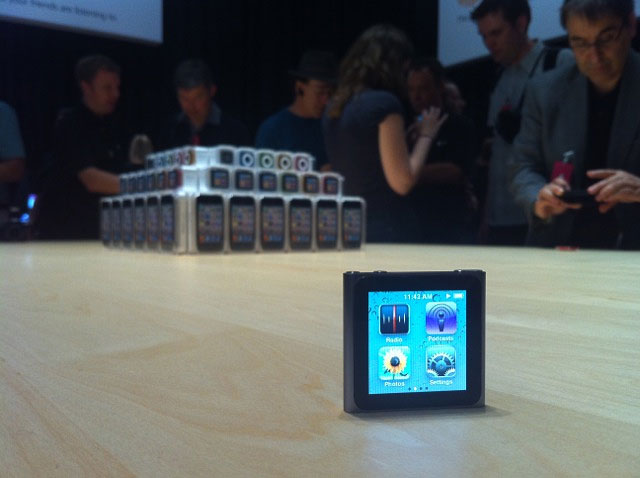 In less than 10 years, firms in China, India and South Korea progressed from no wind turbine manufacturing experience to state-of-the-art wind turbine systems. Consider this: Goldwind from China installed 2,727 MW in 2009, a 140% increase on 2008 that saw its international market share rise to 7.2%. The Indian company Suzlon owns 9% of the global market share. What policies led to such robust domestic wind power development?
In less than 10 years, firms in China, India and South Korea progressed from no wind turbine manufacturing experience to state-of-the-art wind turbine systems. Consider this: Goldwind from China installed 2,727 MW in 2009, a 140% increase on 2008 that saw its international market share rise to 7.2%. The Indian company Suzlon owns 9% of the global market share. What policies led to such robust domestic wind power development?
Last month, the International Finance Corporation's (IFC's) Cleantech Investment Program hosted Dr. Joanna Lewis, a professor at Georgetown University’s School of Foreign Service, to share research on the strategies used by wind power technology companies in China, India and South Korea to develop wind turbine technology. Lewis is working on a paper that details case studies of the current industry leaders in these three countries, including Suzlon (India), Goldwind (China), and Hyundai, Doosan and Daewoo (South Korea).
innovation DAILY
Here we highlight selected innovation related articles from around the world on a daily basis. These articles related to innovation and funding for innovative companies, and best practices for innovation based economic development.
Seven Lessons From Inc. 500 Companies
Inc. Magazine’s annual list of the 500 fastest growing U.S. privately-held companies just hit the newsstands, accompanied by an expanded list of an additional 4,500 on Inc.com (full disclosure: I’m a contributing editor at Inc.). Since it measures revenue growth over a four-year period (2006-2009 for the 2010 list), the list is typically a striking reflection of socioeconomic and industry trends.
For instance, in 2007, construction, manufacturing, and hu
Climate Change Is Worse Than We Thought
T he challenge of climate change and its warrior activists have asked
many things of us -- changing to energy-efficient lightbulbs, biking to
work, flying less, turning off the lights more often, and more -- but
even with the most severe treatment for the global threat, a new report from the Proceedings from the National Acadmey of Sciences of the United States of America says that repairing the damage will prove extremely difficult and non-cost-effective.
he challenge of climate change and its warrior activists have asked
many things of us -- changing to energy-efficient lightbulbs, biking to
work, flying less, turning off the lights more often, and more -- but
even with the most severe treatment for the global threat, a new report from the Proceedings from the National Acadmey of Sciences of the United States of America says that repairing the damage will prove extremely difficult and non-cost-effective.
Severe treatment would mean injecting "sulphur dioxode particles equivalent to a major volcanic eruption, such as that of Mt Pinatubo, every 18 months to reduce temperatures and delay ice-cap melt and sea-level rises," The Ecologist reports. Other options include installing mirrors in space and afforestation. All of the above fall under the category of "geoengineering."
Harris: Amid venture capital industry shakeout, some angel investors turn 'pro'
I
Textbooks, as we have known them, are dinosaurs stumbling toward extinction. Inkling, which is based in San Francisco and has already struck deals with publishers Cengage Learning and McGraw-Hill to add interactive content, aims to usher in a new era in which college students will tote virtual libraries on tablet computers and laptops, with the usual text enhanced by videos, 3-D displays, quizzes and social interaction.
Aydin Senkut, an ex-Googler, had an inkling about Inkling while he was making a mint on Mint, the online personal finance startup that Intuit acquired last September for $170 million. Tablet computers were largely a rumor when Senkut invested in Inkling founders Matthew MacInnis, Robert Cromwell and Josh Foreman, impressed by their vision for reinventing the textbook from scratch.
Taking a Partner Can Help...or Hinder
 For start-ups lacking sufficient cash to survive, a partner with deep pockets may be a more attainable lifeline than traditional sources of funding.
For start-ups lacking sufficient cash to survive, a partner with deep pockets may be a more attainable lifeline than traditional sources of funding.
Venture-capital investments in seed and early-stage companies totaled just $6.31 billion in 2009, compared with $6.96 billion in 2008, according to PricewaterhouseCoopers LLP and the National Venture Capital Association.
Meanwhile, only half of small businesses that tried to borrow money last year got all or most of what they needed, concludes a study from the National Federation of Independent Business, a Washington trade group. And with the unemployment rate at nearly 10%, family and friends may be just as unlikely a resource.
Quiz: Are You Hiring and Breeding Greedy and Selfish Employees?
 For those managers worried they are staffing their teams with a bunch of jerks, we have this handy quiz! Answer truthfully and learn if you are a leader of obnoxious superstars.
For those managers worried they are staffing their teams with a bunch of jerks, we have this handy quiz! Answer truthfully and learn if you are a leader of obnoxious superstars.
EGOS Survey (Evaluation Gauge for Obnoxious Superstars)
Answer true or false to each statement below. The people who get ahead at my workplace:
- say "we" but think "me."
- see their peers as competitors, even "the enemy."
- remove subordinates' names from good work before passing it up the chain.
- belittle others' triumphs and successes.
- hoard their ideas because, after all, there is no reward for sharing them with colleagues.
Your Smartphone Will Soon Double as Your Wallet
 The Japanese call it osaifu keitai (cell-phone wallet). Flash your phone virtually anywhere you go for almost any purchase and it's automatically logged into a digital expense report. Eat frequently at McDonald's? Tap your phone to pay and your all-in-one debit card/receipt tracker/loyalty program may instantly offer you 10% off.
The Japanese call it osaifu keitai (cell-phone wallet). Flash your phone virtually anywhere you go for almost any purchase and it's automatically logged into a digital expense report. Eat frequently at McDonald's? Tap your phone to pay and your all-in-one debit card/receipt tracker/loyalty program may instantly offer you 10% off.
Today, if you want to enjoy these benefits, you have to go to Japan. But after years of talk, wireless carriers, banks, startups, and handset makers are now actively working to transform Americans' cell phones into mobile wallets. The goal: to snag a share of the processing fees associated with the $3.2 trillion in annual retail credit-card charges, and to turn the $1.2 trillion in cash and check spending into digital transactions.
Top 10 Metros for Economic Growth Potential
We recognize that growth potential is not determined by size; in fact, there are a number of "overgrown" metropolises in the U.S. that rapidly are being outpaced by mid-sized contenders. Also, some of the most dramatic growth possibilities can be found in smaller communities. So we've divided our Top 10 Metros for Economic Growth Potential ranking into two sub-categories, giving large cities and their smaller brethren a changes to shine side by side.
Download the full PDF
Mid-sized cities make progress in revitalizing downtowns
 When Dan Christian and his wife recently decided to move their family from Toronto to London, Ont., they were looking for a place to raise their children and launch a new tech venture.
When Dan Christian and his wife recently decided to move their family from Toronto to London, Ont., they were looking for a place to raise their children and launch a new tech venture.
But rather than head for the suburbs, as hordes of people have done for decades in this and other mid-sized Canadian cities, they found the lifestyle they were looking for in a rejuvenating downtown core.
They were blown away by the funky boutiques and fine dining on King Street and other bustling boulevards. They were equally impressed by an influx of new companies and an increasingly sophisticated entrepreneurial environment.
Hands-on with new Apple TV and iPods; and notes on Ping, the iTunes social network
 Apple showed off the latest editions of its iPod lineup and the Apple TV earlier today. The new iPod Nano loses the physical controls and adopts a multitouch display. The iPod Shuffle, however, gets them back.
Apple showed off the latest editions of its iPod lineup and the Apple TV earlier today. The new iPod Nano loses the physical controls and adopts a multitouch display. The iPod Shuffle, however, gets them back.
Follow these ‘10 commandments’ to secure angel investment
 Writing on the blog sponsored by the Rockstar Group, a U.K.-based entrepreneurial consulting firm, social media strategist Laura Hillman describes “10 commandments” to secure angel investment:
Writing on the blog sponsored by the Rockstar Group, a U.K.-based entrepreneurial consulting firm, social media strategist Laura Hillman describes “10 commandments” to secure angel investment:
1. “Better the devil you know.” Prove your in-depth knowledge of your own business and that of your primary competitors by presenting potential investors with a comprehensive business plan a week before your pitch meeting. Include a description of your business, financial projections for the current and next two fiscal years, and background on your management team, short- and long-term business objectives, key products and services, target market, competitors, and main suppliers. The business plan also should touch on your marketing and sales strategies and your long-term exit plan. “Writing a detailed business plan requires succinct writing skills, clarity of style, and in-depth knowledge of your marketplace,” Hillman writes.
Seven Ages of the Body
This new video from Cambridge University, featuring archaeologist John Robb, gives you a quick and visually appealing introduction to how humans have understood something we take for granted – our own bodies. Covering 10,000 years in six minutes, Robb takes us from the “Animal Body” and “Sexualized Body” of the Mesolithic and Neolithic Ages, to the “Politicized Body” of the Classical Age, “God’s Body” of the Middle Ages, and finally “The Body as Machine,” the metaphor we have been living with since 1500. And we wrap up with the “Body Digital,” the body of the future, and “Multiple Bodies.” This video comes from the Cambridge Ideas series available on Cambridge’s YouTube channel.
Second chance to get wealthy off the Web
The dot-com IPO market has matured a lot since Netscape gave birth to it 15 years ago. But it has been virtually nonexistent since the spring of 2000 when the Web bubble burst, sending an estimated US$6-trillion worth of shareholder wealth into oblivion.
Now the gloom is lifting and the likes of Skype, Hulu and other Web 2.0 giants could spawn a rebirth, giving investors a new chance to get wealthy off the Web.
“The risks have shifted today,” says Greg Goldfarb, principal with Summit Partners, a venture capital firm specializing in growth equity investments. “In the 1999 era, the risks were really related to blowup risk.”
Four Minutes In The Morning
 Amy and I created a tradition about a decade ago we call “four minutes in the morning.” We try to – fully clothed – spend four minutes together every morning 100% focused on each other.
Amy and I created a tradition about a decade ago we call “four minutes in the morning.” We try to – fully clothed – spend four minutes together every morning 100% focused on each other.
I’m an early bird – usually getting up around 5am regardless of the time zone I’m in (except on the weekends – then I sleep until I wake up – sometimes 1pm.) Amy sleeps a little later (usually 6:30am). So – I often have around 90 minutes alone every morning, which I treasure. I have a well defined morning routine that includes a cup of coffee and 85 or so minutes in front of my computer.
UK IP Office unveils new research programme
 The UK Intellectual Property Office has kicked off a year long research programme into intellectual property and its value to the economy, with the aim of ensuring policy and decisions are supported by appropriate evidence.
The UK Intellectual Property Office has kicked off a year long research programme into intellectual property and its value to the economy, with the aim of ensuring policy and decisions are supported by appropriate evidence.
The programme, in which the UK Intellectual Property Office will work with partners elsewhere in Europe and in the US, includes an assessment of the role intellectual property plays in the knowledge economy and an analysis of data on levels of investment in copyright and design.
12 Tips for Writing Better Content
 Admit it: Sometimes you wonder if your content is really any good. Sure, you worked hard to write it, but you’re a business owner, not a professional writer. Are readers connecting with it? Do they understand what you’re trying to say? Is there an easy way for you to tighten things up and improve upon what’s already there?
Admit it: Sometimes you wonder if your content is really any good. Sure, you worked hard to write it, but you’re a business owner, not a professional writer. Are readers connecting with it? Do they understand what you’re trying to say? Is there an easy way for you to tighten things up and improve upon what’s already there?
Fear not, of course there is! Here are some tips to help you improve and write better content. It’s like 10th grade English without the fear of getting called on when you’re not paying attention.
Boss on Wheels
 Remember the Segway? It never quite revolutionized transportation, but a similar mobility technology now underpins this telepresence robot, called Anybot. It glides on two wheels around an office or factory to let workers videoconference with the boss, who can control the contraption from a remote keyboard. The Anybot is equipped with an obstacle-sensing and guidance system to avoid crashing into things.
Remember the Segway? It never quite revolutionized transportation, but a similar mobility technology now underpins this telepresence robot, called Anybot. It glides on two wheels around an office or factory to let workers videoconference with the boss, who can control the contraption from a remote keyboard. The Anybot is equipped with an obstacle-sensing and guidance system to avoid crashing into things.
Surprising Entrepreneurship Lessons From Around The World
 The United States has lost its entrepreneurship monopoly. The sudden successes of global competitors from emerging economies, as well as my case studies of entrepreneurs from Lebanon to Brazil to China, are exploding the myths of entrepreneurial success and exposing the realities. Here are a few of the lessons I've learned from my study of international entrepreneurship:
The United States has lost its entrepreneurship monopoly. The sudden successes of global competitors from emerging economies, as well as my case studies of entrepreneurs from Lebanon to Brazil to China, are exploding the myths of entrepreneurial success and exposing the realities. Here are a few of the lessons I've learned from my study of international entrepreneurship:
1. Entrepreneurship is not about innovation. In reality,
successful entrepreneurs tend to make minor adjustments to existing
products, services and business models, and then learn by executing in
short-cycle iterations. This is a process I call "minnovation."
Deloitte and The Manufacturing Institute Labor Day Survey: Americans Support Nation's Workforce, but See Government Policies Creating a Disadvantage for Manufacturing Sector
![]() NEW YORK, Sept. 2, 2010 - Americans expressed faith in the country's workforce but voiced concerns that government policies may be putting the manufacturing sector at a disadvantage and dissuading Americans from pursuing production jobs, according to a new Labor Day survey from Deloitte and The Manufacturing Institute.
NEW YORK, Sept. 2, 2010 - Americans expressed faith in the country's workforce but voiced concerns that government policies may be putting the manufacturing sector at a disadvantage and dissuading Americans from pursuing production jobs, according to a new Labor Day survey from Deloitte and The Manufacturing Institute.
The second annual Public Viewpoint on Manufacturing survey, released today by Deloitte and The Manufacturing Institute, indicates that 78 percent of Americans have a strong view of the significance of manufacturing, seeing it as very important to the country's economic prosperity. A similar number of respondents, 76 percent, indicate that manufacturing is very important to the standard of living in the United States.

